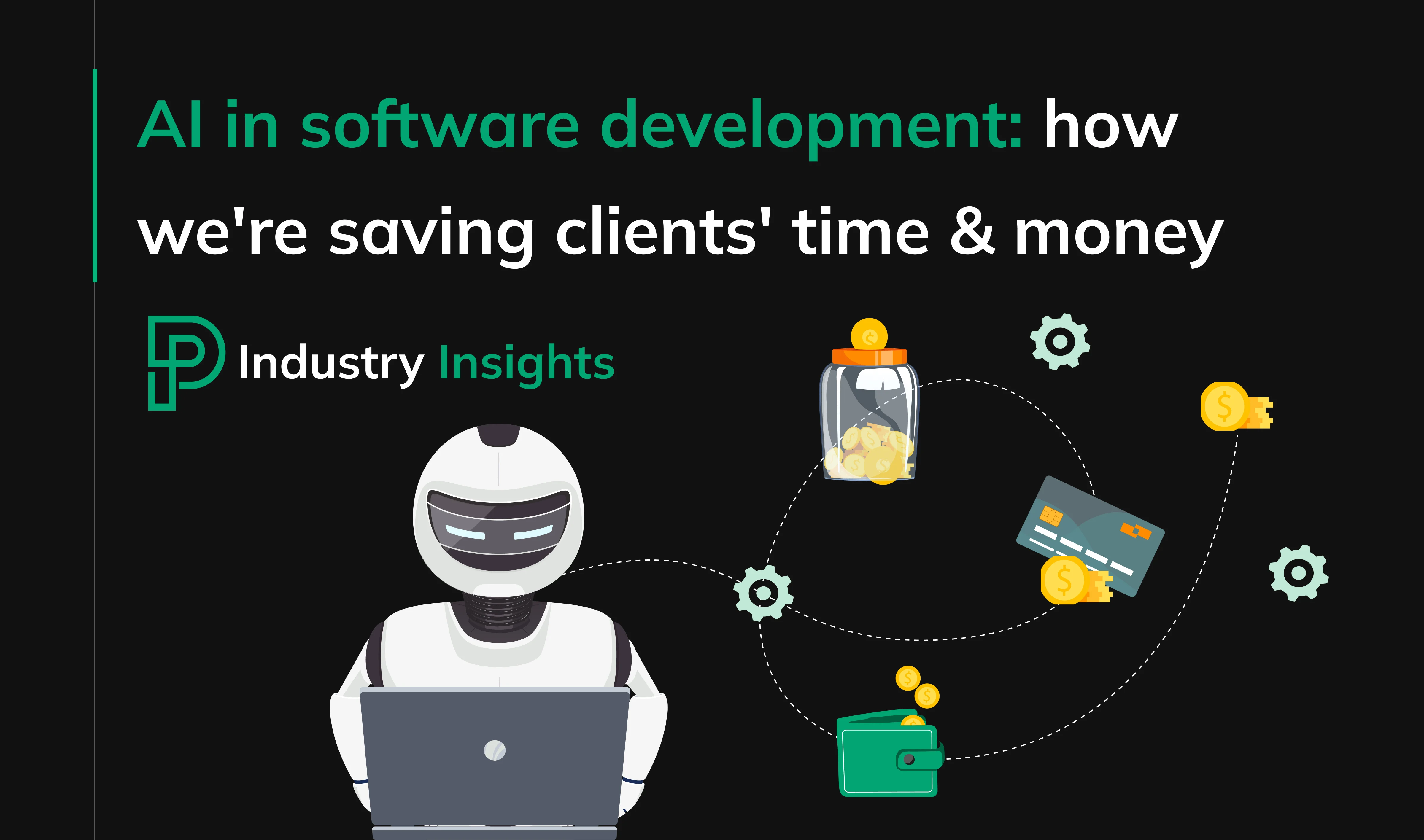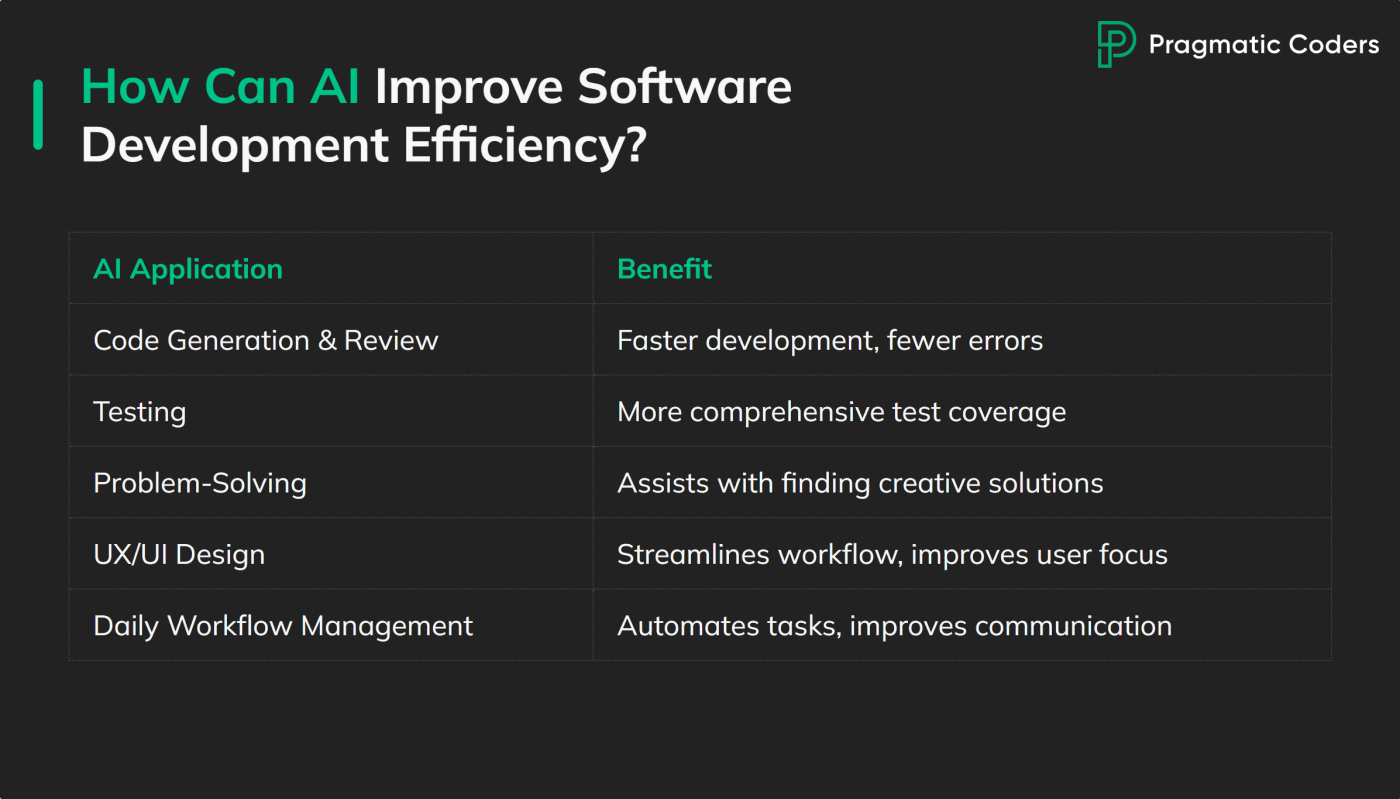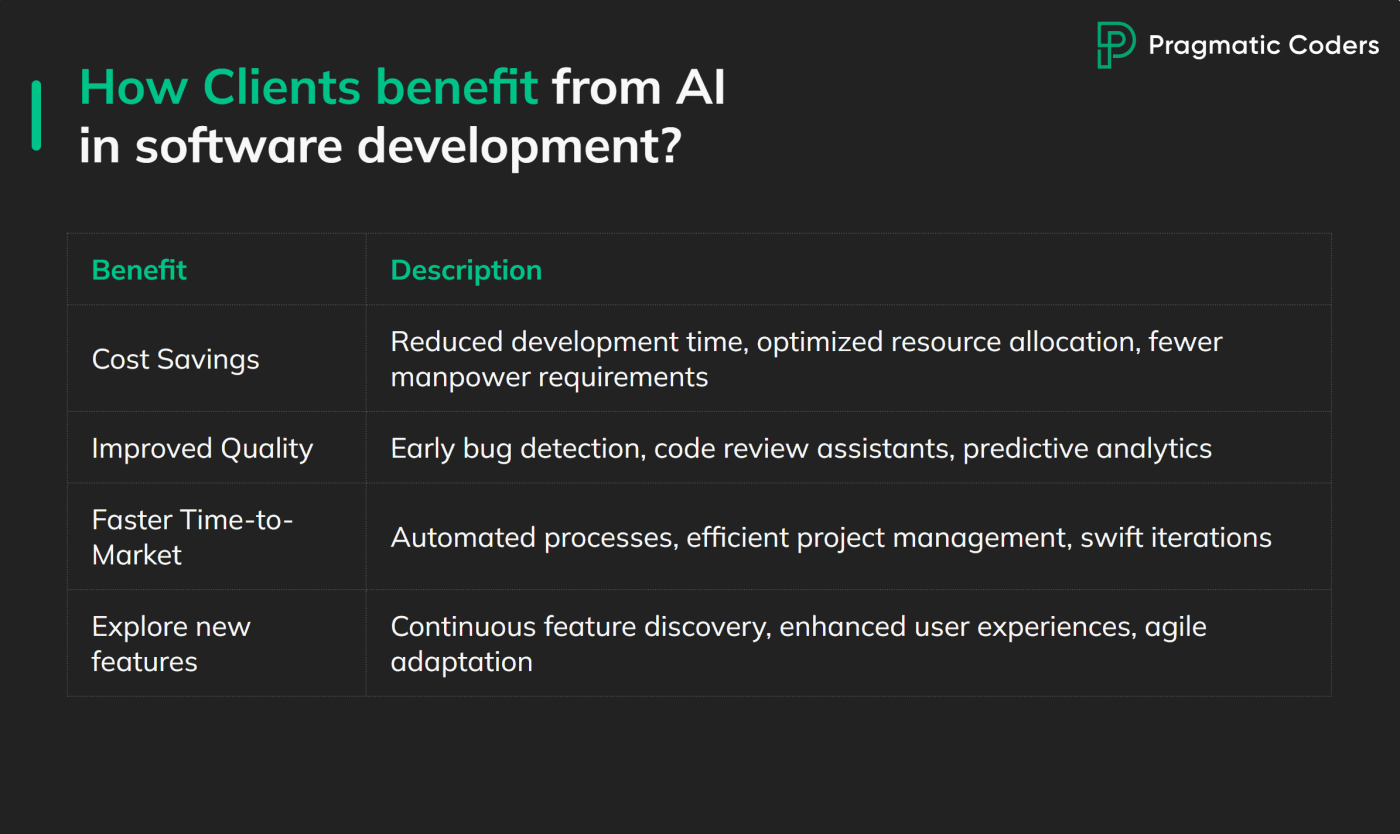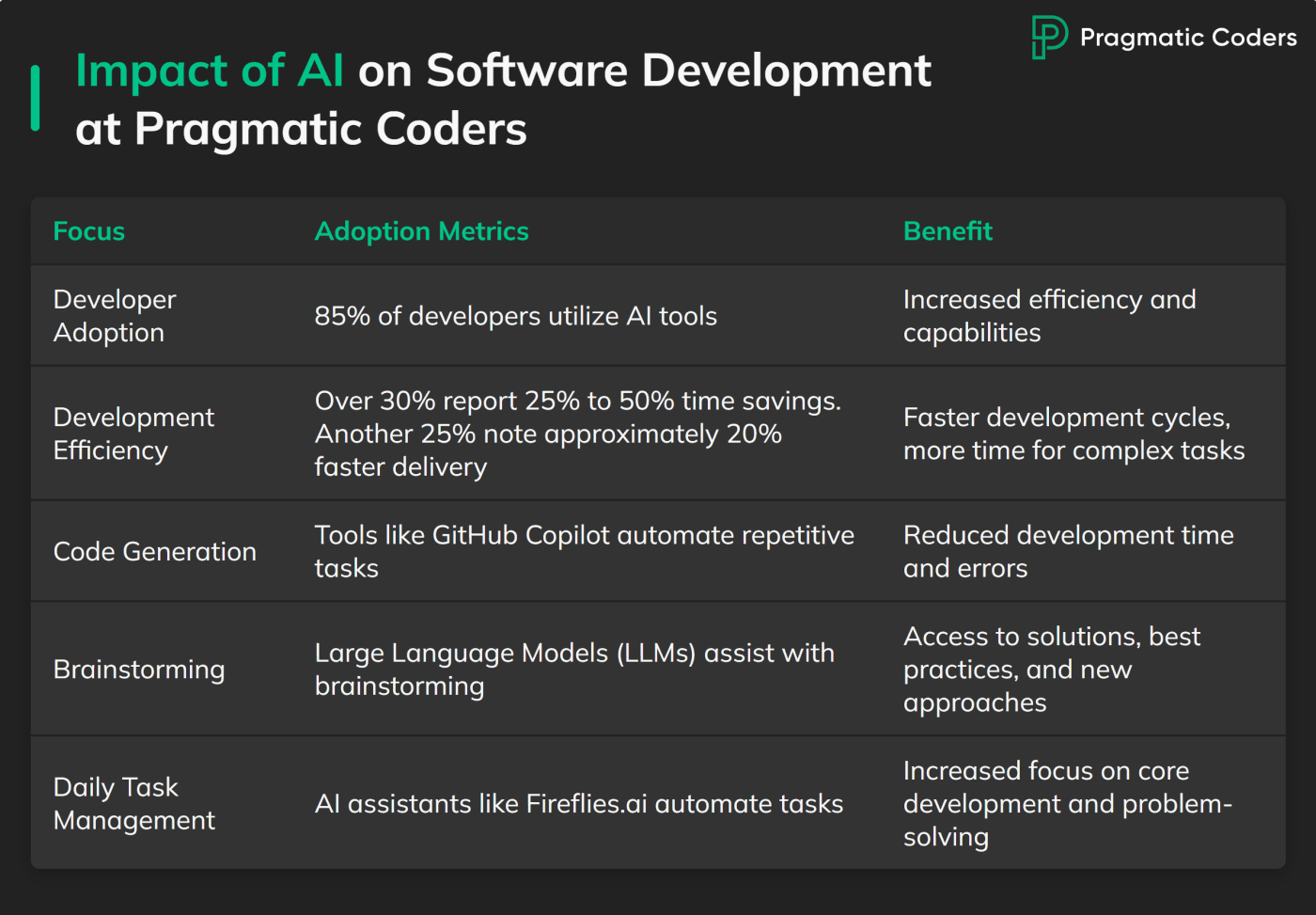AI Coding in Software Development: Boost Efficiency & Cut Costs

Welcome to Industry Insights, where our software experts share deep industry wisdom.
Artificial intelligence (AI) is swiftly changing industries worldwide, making significant impacts from healthcare to manufacturing. Through custom AI agents, organizations can harness AI’s revolutionary capabilities to process large datasets, recognize patterns, and automate complex tasks.
In software development services, AI is becoming essential, enhancing productivity and efficiency. A Statista report forecasts that the global AI market will hit an impressive $738.8 billion by 2030. This highlights AI’s vast potential to innovate the software development process and open new opportunities for businesses and consumers alike.
This article explores how software companies can use AI to save costs and time significantly. By integrating AI systems and tools at different development stages, software houses can boost team performance, speed up project completion, and produce superior software solutions more quickly. This not only improves their market position but also offers competitive advantages.
Key points
|
How can AI improve software development efficiency?
In today’s fast-paced software engineering landscape, AI introduces a wealth of tools and techniques. These significantly boost efficiency and productivity, leading to faster software delivery for clients. The gains are so substantial that businesses are beginning to reimagine how AI-augmented software should be built. Here’s a breakdown of the key AI and ML (Machine Learning) applications in software development:
AI-powered code generation and review
Tools like OpenAI’s Codex and GitHub’s Copilot are transforming the way software developers write code by automatically generating code snippets from natural language descriptions. This approach has multiple benefits. It not only speeds up the coding process but also minimizes errors. As a result, it ensures the quicker delivery of high-quality software.
AI-driven testing for comprehensive coverage
AI-based testing platforms, such as Applitools and Testim, leverage machine learning to automate the creation, execution, and analysis of test cases. These tools are designed to emulate human cognition. They accurately detect UI/UX discrepancies, edge cases, and performance bottlenecks.
AI-powered support for problem-solving
When developers face complex challenges, generative AI solutions can provide essential support. Large Language Models (LLMs) like Gemini, ChatGPT, or Bing Copilot excel at grasping technical issues and proposing viable solutions. By describing problems in natural language, developers gain access to a wealth of resources. They can tap into extensive databases, documentation, and forums for solutions. This approach fosters innovation and enhances software robustness.
AI-streamlined UX/UI design
AI significantly improves the UX/UI design process. Powerful tools, equipped with AI—such as Uizard—offer multiple advantages in this area. They can analyze user interaction data and design preferences, allowing for the creation of initial drafts and prototypes. This optimizes the design phase, freeing designers to concentrate on creativity. Furthermore, it ensures the end product meets user expectations.
AI-enhanced daily workflow management
Optimizing the daily grind for software development teams can yield significant benefits. It allows software engineers to focus on creative solutions that set their products apart. Intelligent tools, such as Fireflies.ai, Otter.ai, and Grammarly, serve as virtual assistants in various capacities. They automate tasks such as meeting transcription, grammar correction in code comments, and enhancing overall communication efficiency.

AI in software development: benefits for clients
Incorporating AI into software development brings a host of benefits to clients. Let’s delve into how AI enables you to meet your business goals more effectively:
Cost savings
AI-driven software development brings significant cost savings in several key areas:
- Quicker Development: AI can automate time-consuming activities such as mundane code writing and testing. This enables developers to focus on core tasks and problem-solving. As a result, it leads to faster development cycles and quicker software releases. A shorter time-to-market offers significant advantages. It not only captures market opportunities sooner but also leads to earlier revenue generation.
- Better Resource Allocation: AI can predict resource needs more accurately by analyzing past project data and industry trends. This foresight prevents the wasting of resources on overstaffed tasks. It ensures efficient use of budget and personnel. Additionally, it makes sure the right skills are available at the right time.
- Reduced Labor Costs: AI can streamline or replace tasks usually performed by humans, like manual testing and code reviews. This lowers the number of personnel needed for a project, cutting down on development team costs.
Improved quality
Ensuring software quality is crucial for client satisfaction and the success of product launches. AI significantly contributes to this area by:
- Early Bug Detection: AI-powered testing tools can scrutinize code and user interactions early in the development cycle, spotting potential flaws. This proactive stance plays a crucial role in software development. It helps prevent bugs from progressing to the production stage. As a result, it saves the time and effort that would otherwise be spent on fixing issues after release.
- Code Review Assistance: AI can serve as a real-time assistant during code reviews. It examines code as it’s written, identifying potential problems (such as security risks or poor coding practices). This approach helps maintain coding standards and best practices. As a result, it leads to the development of more secure and efficient software.
- Predictive Analytics: By analyzing vast datasets, AI can forecast potential software issues before they happen. Developers can then take preemptive action to solve these identified problems in advance. This further boosts the software’s quality and enhances the overall user experience
Faster time-to-market
In the competitive world of software development, getting your innovative solutions to market first can provide a significant edge. AI tools help speed up this process by:
- Automating Routine Tasks: AI can take over repetitive duties such as code generation, regression testing, and data analysis. This automation saves developers’ time and accelerates the development cycle.
- Streamlining Project Management: AI-driven project management tools analyze data to improve schedule planning, resource distribution, and risk management. This efficient management plays a crucial role in project execution. It helps keep projects on course, preventing delays that could slow down market entry.
- Enabling Rapid Iterations: With AI, development cycles become faster, allowing for swift updates and feature releases. This flexibility offers significant advantages. It allows for a quick response to market trends and user feedback. As a result, the maintenance of your software’s leading edge in innovation can be ensured.
Increased innovation
By delegating routine tasks to AI, developers can channel their expertise and creativity into more impactful projects:
- Innovating Features: The time saved from repetitive tasks enables developers to explore and integrate new, exciting features. This innovation helps set your software apart from competitors.
- Improving User Experiences: AI can personalize user interfaces, suggest content that’s most relevant, and anticipate user needs. Such tailored experiences significantly enhance user engagement and satisfaction. This, in turn, boosts loyalty and contributes to the product’s success over time.
- Adapting with Agility: AI’s ongoing analysis of user behavior and market trends helps pinpoint opportunities for enhancement. This proactive approach ensures that your software continually evolves. It helps meet user demands and stay ahead in a dynamic environment.

How we’re saving clients’ time & money with AI
The impact of AI on software development is no longer theory—it’s reshaping our industry right now. At Pragmatic Coders, we understand the urgency of delivering high-quality software fast. That’s why we use AI to streamline our processes and sharpen our team’s skills. We’ve also made a guide on how to use Cursor AI for software development. Our research shows that 85% of our developers already use AI tools. Of these, 25% have increased their work speed by around 20%. More than 30% report time savings between 25% and 50%.
Here’s a closer look at how we’re leveraging AI for tangible client benefits:
- Code Generation Acceleration: We use advanced AI developer tools like GitHub Copilot, Cursor, Windsurf, and Aider. They automate repetitive coding tasks. Each one transforms natural language into high-quality code. You get inline completions, multi-line suggestions, and entire code blocks. GitHub Copilot provides real-time code advice right in your IDE. Cursor, built on VS Code, offers strong multi-line completions and auto-import features. Windsurf boosts productivity with its agentic Cascade system for smooth multi-file editing. Aider brings AI-powered pair programming to the command line. These tools shorten development time and cut errors. They also spark new insights and help us solve problems faster.
- Enhanced Brainstorming with Large Language Models (LLMs): Models like GPT o1, o3-mini, Grok 3, Claude 3.7, and Gemini offer more than just coding assistance. We describe our challenges in plain language, and these models connect us to vast code repositories and documentation. They also review project requirements, generate test scenarios, and propose UI improvements. Through their insights, we uncover best practices and discover fresh approaches. This process not only saves time but also sparks new ideas for both developers and stakeholders.
- Streamlining Daily Tasks: We use a range of AI solutions, including Fireflies.ai, Tactiq, Grammarly, NotebookLM, and more. These tools automate meeting notes, grammar checks, and data organization. Our developers spend less time on routine tasks. They focus more on critical work, strategy, and problem-solving. This approach boosts overall productivity and drives better results across the team.
Challenges and considerations
Although AI provides clear benefits, it’s normal for clients to have questions and concerns. Here are three important points to consider when using AI in software development:
Ethics of AI-assisted software development
AI algorithms are potent, yet they come with limitations. A major issue is the potential for bias in AI models, which often arises from the data used for training. If this data lacks diversity or doesn’t accurately represent the real world, the AI could unintentionally perpetuate or even worsen existing biases, affecting tasks like code review or code generation.
Expertise and experience
Not every software company excels in using Artificial Intelligence. It’s crucial to pick one that has a solid track record and clear expertise in AI. Search for a partner that knows how to choose the right AI tools for your project, integrate them smoothly into your development process, and use them effectively to meet your goals. This expertise is key to fully benefiting from AI and unlocking its total potential for your software project.
The irreplaceable human touch
AI significantly boosts efficiency and productivity in software development, yet the question often arises: can AI replace programmers? The answer is a clear no (at least for now). Despite the sophistication of AI algorithms, they lack the critical thinking, creativity, and intuition that human developers bring to the table. Software development is not merely a technical process but also a creative endeavor that requires empathy, understanding, and context—qualities uniquely human. These traits allow developers to interpret complex requirements, adapt to shifting challenges, and collaborate effectively with clients and teammates.
As AI becomes more integrated into coding workflows, ensuring high safety standards is paramount. Knowing this, we’ve developed a set of safety guidelines to help our programmers work alongside AI more securely and responsibly. We shared them in our guide to secure AI-assisted coding.
Conclusion
The software development landscape is changing dramatically, thanks to Artificial Intelligence. By embedding AI tools across the development process, software companies can boost their teams’ efficiency, simplify workflows, and quickly deliver top-notch software solutions.
Using AI in your software strategy isn’t just about staying up-to-date; it’s about getting ahead of the competition. Working with a software partner skilled in AI can truly set you apart.
Don’t miss out on the future of digital product development. Reach out to us now. Let AI enhance your software projects and take your business to the next level.









